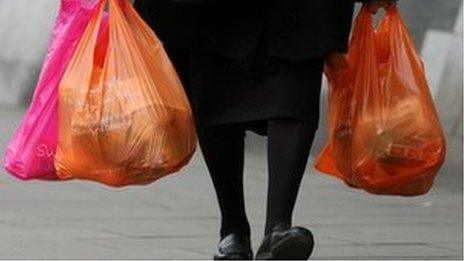Q&A: Carrier bag charges in NI increase from 5p to 25p
- Published
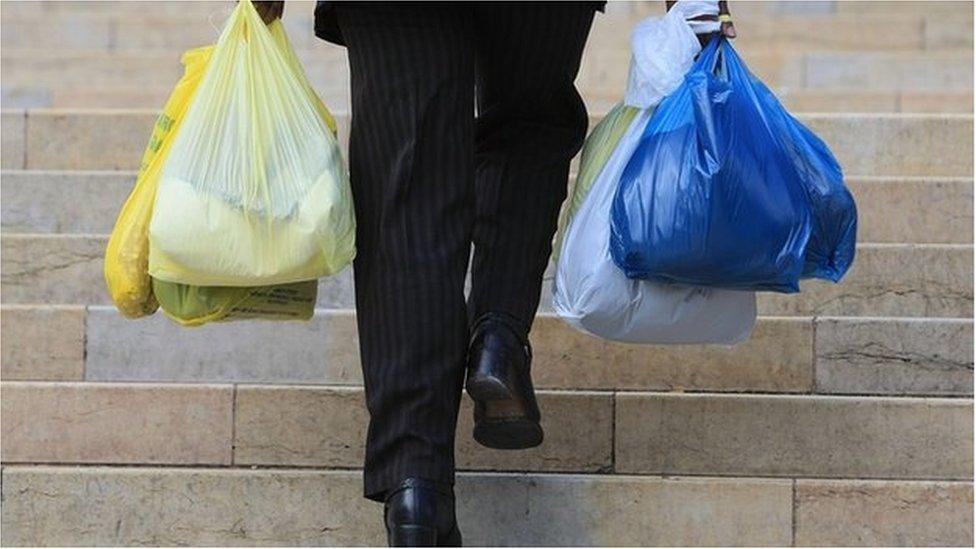
The charge was first introduced in Northern Ireland eight years ago
The charge for a carrier bag in Northern Ireland has increased from 5p to 25p.
The change took effect on Friday, after being announced by Environment Minister Edwin Poots back in November 2021.
Introduced in 2013, the aim of the levy was to help improve the environment by encouraging the reuse of carrier bags and prevent unnecessary buying of bags.
Some £37m raised has been reinvested to support the environment, according to a Stormont department.
What is the carrier bag levy?
By law, retailers in Northern Ireland must charge a levy for all new carrier bags being sold.
Last year, the environment minister said the 5p levy had helped to remove more than 1.7bn bags, external from circulation.
Edwin Poots added that the latest move - to increase the charge to 25p - would make the region a "cleaner and more pleasant place in which to live", by reducing the use of plastic.
Both Scotland and England increased charges to 10p last year.
The levy applies to carrier bags when you buy goods including:
groceries, clothing, beauty items and gifts
goods delivered or collected from premises (click and collect) where carrier bags are used.
What do the latest changes mean?
On Friday, the levy increased to 25p, making it the minimum amount that retailers can charge for bags.
All bags under the price of £5 are subject to the charge, regardless of the material or whether they are single use or reusable.
Retailers can also set their own prices for bags which means bag prices can vary.
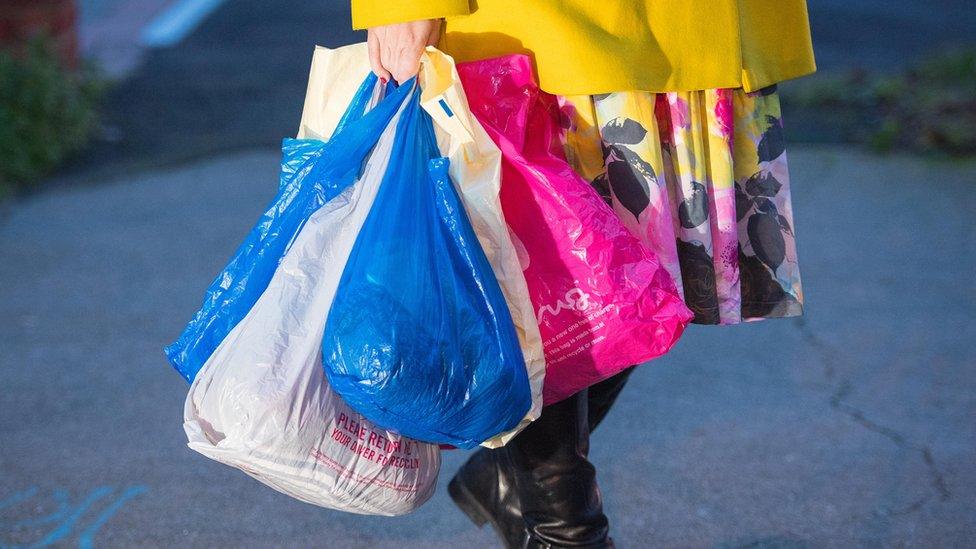
Both Scotland and England increased charges for carrier bags to 10p last year
Is anyone exempt from the levy?
No. But some types of bags are exempt and some retailers only supply these bags. , external
The levy does not apply when carrier bags:
only contain items such as unpackaged food, seeds and bulbs, axes, knives or razor blades, goods contaminated by soil and some medicinal products
are of certain sizes and used only to contain packaged uncooked meat or fish
contain takeaway hot food and hot drinks
are sealed transit bags at restricted areas in airports
are specialist bags, such as mail order and courier bags
are made of any material with a maximum dimension of 125mm (width) x 155mm (height) and a maximum gusset of 50mm
contain live aquatic (fish)
are supplied for free to replace worn out "bags for life"
are carrier bags with a retail price of more than £5
contain items or appliances supplied under a prescription
Where does the extra money raised go to?
Money from the levy is administered by the Department of Agriculture, Environment and Rural Affairs (Daera) and is used within Northern Ireland to fund environmental projects.
A Daera spokesman confirmed that the £37m reinvested into the environment over the last nine years, as a result of the levy, had benefitted "everything from birds to bees, water and land, also protecting our countryside and natural heritage".
The Environment Fund, external is one of the ways through which the money from the carrier bag levy has been used to allow not-for-profit organisations and councils to deliver key environmental priorities.
Through funding these projects, the carrier bag levy helps to sustain, improve and enrich the natural environment in Northern Ireland.
What do retailers think about the extra charges?
The general feeling from industry bodies is that while they understand and agree with the aim of the levy, they believe the increase is "excessive".
Aodhán Connolly, director of the Northern Ireland Retail Consortium, said: "The fact we will have the highest levy in the UK and Ireland, begs the question: 'Why?'
"We can see the rationale to protect the environment but it is coming at a time when household budgets are squeezed.
"For people who are economically vulnerable in the current climate, 25p for a bag rather than 5p seems punitive."
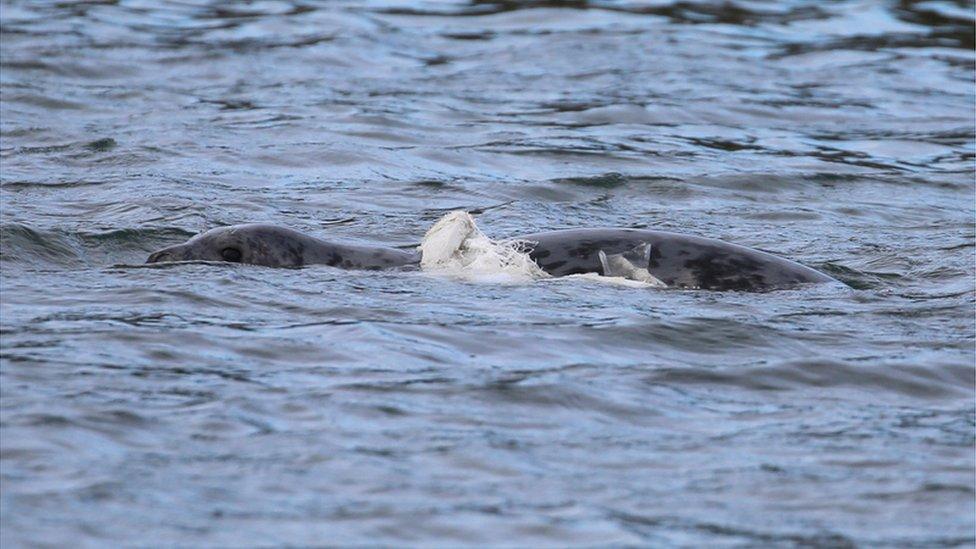
A grey seal found entangled in a plastic bag by Daera staff working around Rathlin Island in December 2019
Retail NI says it argued for the 5p levy to be increased to a "more realistic figure of 10p" in line with England and Scotland.
Chief executive Glyn Roberts said he supported the objective to reduce the level of plastic in circulation and cut down on litter, but the 25p charge would "disproportionally impact on working families who are struggling with the cost of living crisis".
"Successive environment and Daera ministers have never consulted local retailers on how the proceeds of the levy is spent. We want to empower our members to make the decisions themselves on how best to spend the levy which they collect," he added.
Do environmental groups support it?
Yes, it's been widely welcomed by campaign groups.
Ian Humphrey, director of Keep Northern Ireland Beautiful, says the new charge will build on the success of the initial levy.
"The success suggests that applying levies to other plastic single-use items such as coffee and soft drinks cups, would have a similar benefit and would greatly reduce littering of these items," he said.
"We could even take it further and introduce levies on plastic packaging like crisps, confectionary, as well as cigarette butts, to generate much-needed resources for addressing litter prevention."
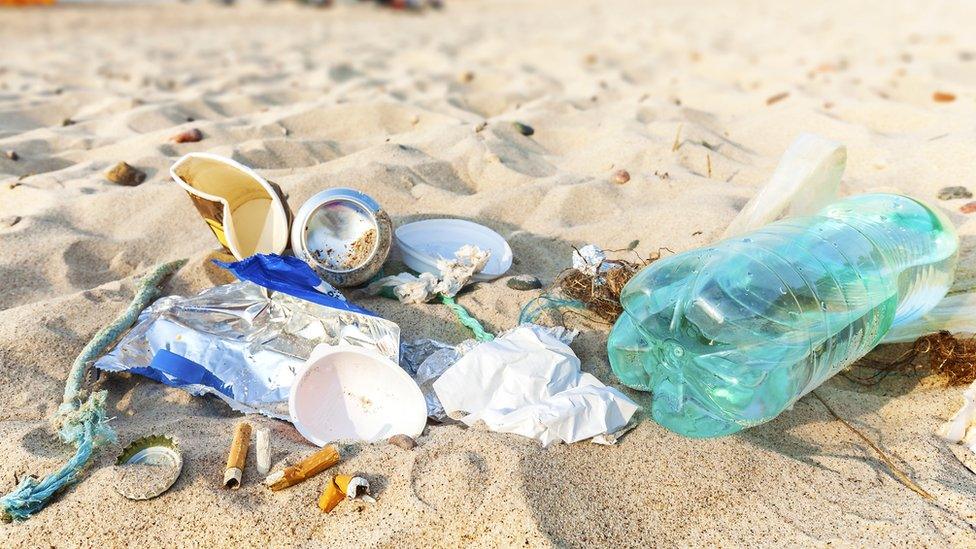
How will the increase charge help to reduce litter?
Mr Humphrey said it would also help in changing the culture from disposable to reuse, and make people think twice before buying bags, both plastic and heavy-duty reusable ones.
"If you reuse a bag just six times then that 25p levy is still costing you less than buying six single-use bags with the current 5p levy, which would be 30p," he said.
How will it benefit the environment?
Mr Humphrey says the environmental benefit "will not be huge" as bags only make up a small percentage of litter they encounter, however, it will have wider benefits for sea waters.

A grey seal found entangled in a plastic bag by Daera staff working around Rathlin Island in December 2019
"Some marine animals such as turtles, mistake these bags for jelly fish and many turtles that wash up dead around our coast are found to have starved to death, having filled their stomachs with indigestible plastic bags, thus making it impossible for them to eat," he said.
Keep NI Beautiful says littering, in general, continues to be a "real issue" that costs ratepayers "tens of millions of pounds annually", despite the region having some of the best infrastructure to deal with waste.
Most recent figures also show there could be millions of items of litter around Northern Ireland's coastline at any one time.
"Littered plastic breaks down into microplastics, which we now know are in the air we breathe, the water we drink and the food we eat," Mr Humphrey said.
"No surprise then that they are now found in our blood too. Who knows just what health impacts this is going to have?"
- Published1 April 2022

- Published22 August 2019

- Published27 August 2014
